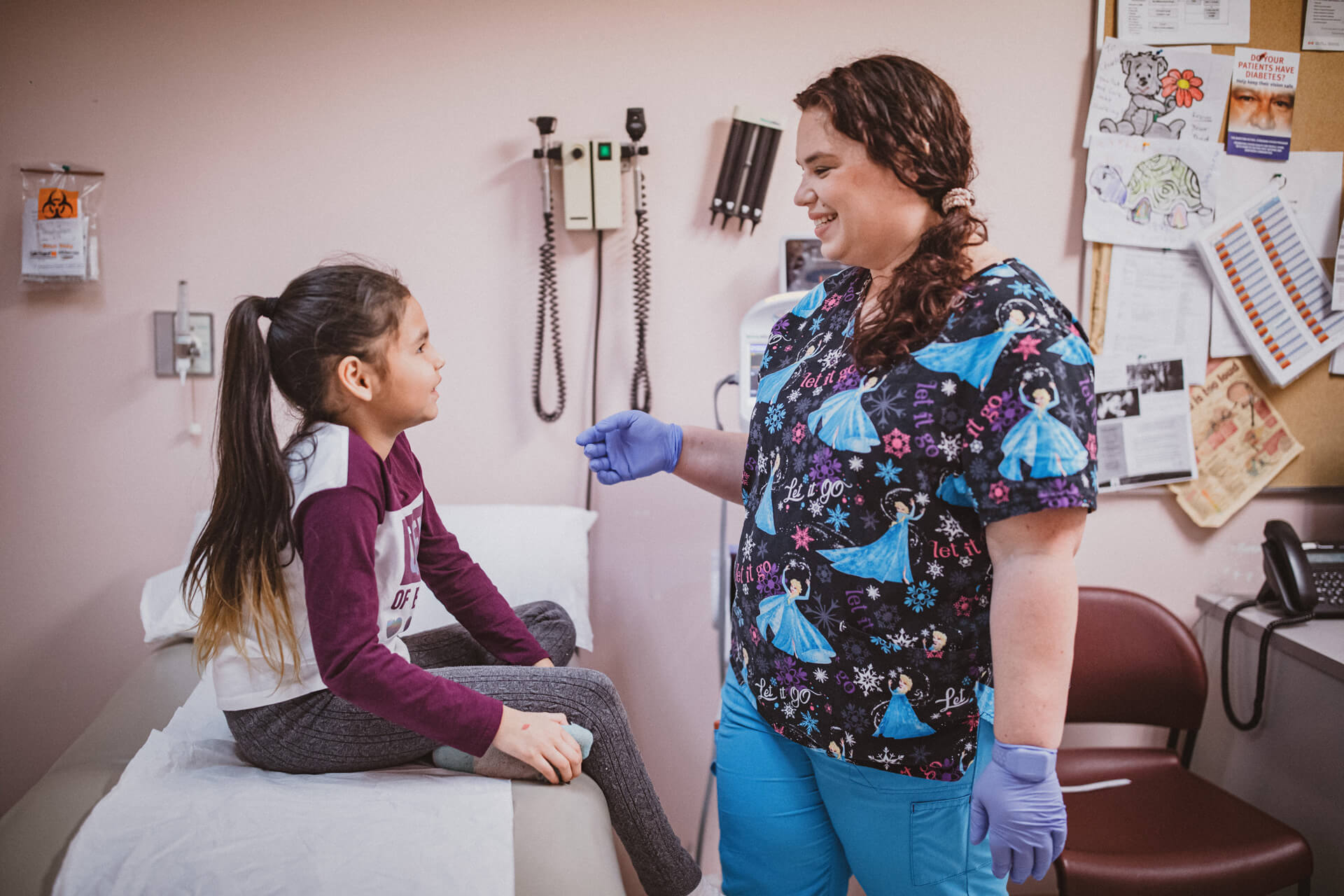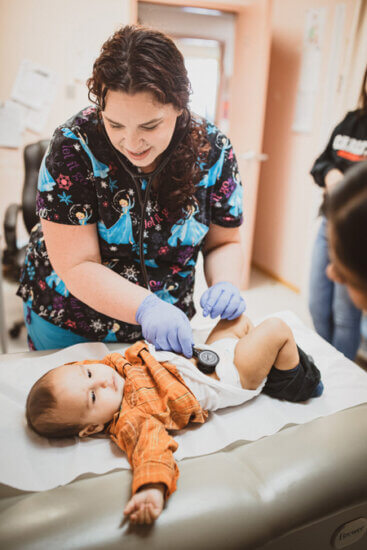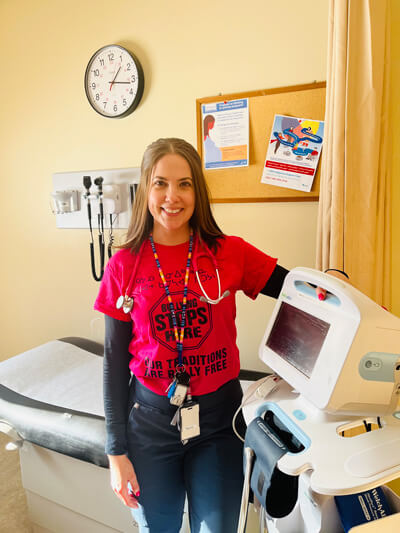Supporting health care in remote and rural Indigenous communities
Chief nursing officer with Indigenous Services Canada says nurses have many opportunities to work to full scope and learn about Indigenous cultures
The top nurse overseeing health-care delivery to remote and rural Indigenous communities across Canada has a simple message for Athabasca University nursing students: you have opportunities in every corner of this country.
“The sky’s the limit,” said Robin Buckland, director general and chief nursing officer with Indigenous Services Canada. “You have so many choices and so many opportunities to learn, develop your skills, and make a positive impact on people’s lives and health care.”
Buckland said nurses can do all of the above and more working for Indigenous Services Canada. The federal department oversees health care for remote and rural Indigenous communities in provinces where access to such services is not available, including in Alberta, Manitoba, Ontario, and Quebec.
“Our nurses are working to their full scope of practice, and that doesn’t happen everywhere,” she explained. “There’s also opportunities to build relationships in the community. Communities are super welcoming and super appreciative of the care provided by our nurses.”
Delivering health care to remote and rural communities
In her role, Buckland is responsible for staffing 50 nursing stations that deliver primary care, home and community care programs, oral health, pharmacy programs. During the COVID-19 pandemic, her teams even ran a dedicated airline to fly health professionals in and out of communities. The department is also engaging with communities on delivering continuing care, including supports for people with developmental disabilities.
“Not just home care, but the continuum of care,” she explained.
In other words, it’s a big job with big responsibilities to ensure the delivery of quality care in remote First Nations communities, and Inuit communities.
To that end, Indigenous Services Canada has been working with Athabasca University’s Faculty of Health Disciplines to explore ways the two organizations can support each other.
As an open and fully online university, AU educates more undergraduate nurses than anywhere else in Canada. Also, more than a third of Canadian nurse practitioner graduates are AU alumni.
“I’m really excited about the opportunities and the potential of the partnership,” Buckland said.

Dr. Steven Johnson, interim dean of AU’s Faculty of Health Disciplines, said pursuing a partnership with Indigenous Services Canada makes sense on several levels. That includes the fact that AU and online learning makes it possible for nurses to advance their education in remote and rural communities.
“By our very nature, Athabasca University is ideally suited to help address ongoing challenges with health care in Canada, including the ongoing shortage of nurses in rural and Indigenous communities,” said Johnson.
“We see the potential for strong synergies between our Faculty of Health Disciplines and Indigenous Services Canada in tackling these challenges so that everyone in this country has access to the health care they need, when and where they need it.”
AU gave me confidence to pursue higher education

AU and distance education both have a soft spot in Buckland’s heart, as a former visiting student herself. She credits AU for helping her kickstart her university experience and career prospects in the mid-90s.
She had already earned a diploma in nursing from Canadore College in northern Ontario and was a single parent juggling full-time work in the intensive care unit at Ottawa’s Civic Hospital.
Buckland said she wanted to return to school to advance her education. She took several AU courses, including French, which left her feeling better prepared to take on a bachelor of science in nursing, and eventually a master’s degree, both from the University of Ottawa.
“Those courses were quite impactful to me just in terms of giving me the confidence to move forward in academia,” she explained.
Pandemic worsens nursing shortage
Working with AU, where 12% of students live in rural communities, makes a lot of sense. The COVID-19 pandemic compounded an existing global shortage of nurses, Buckland said.
“The shortage of nurses has grown very significantly. During the pandemic, our utilization of agency contract nurses more than doubled,” she says. “It’s started to level off, but recruitment and retention of nurses is definitely our biggest challenge.”
One of the department’s key initiatives also includes Jordan’s Principle, which requires that all First Nations children living in Canada should have access to health, social, and educational needs when and where they need them.
Ensuring equity and access to health care
Jordan’s Principle is named after a five-year-old Manitoba boy who died in hospital. That tragedy resulted in the landmark 2016 Canadian Human Rights Tribunal ruling that Canada’s approach to services for First Nations was discriminatory.
Until recently, Jordan’s Principle was under Buckland’s directorate. The program is so significant, it was split into its own initiative.
Buckland said nurses who join the department receive training and orientation to help them learn about different Indigenous cultures and to provide health care in a culturally safe way. Though she is not Indigenous herself, her role will eventually be filled by an Indigenous chief nursing officer. ”That’s always been the goal,” she said.

Athabasca University Master of Nursing – Nurse Practitioner grad Kayla Milley in an exam room in Fox Lake, Alta. Image courtesy: Kayla Milley
The ultimate long-term goal for the department is to ensure that First Nations are equipped to run and manage their own health systems. To achieve that level of self-determination first requires creating a health system that is as good or as equal to other health systems in Canada, Buckland said.
“I think you’re seeing more and more across health systems and health-care providers demonstrating a commitment to reconciliation,” she said.
“A good place to start is to have a level of understanding and knowledge in terms of history, and then as a provider, to have that cultural competency and continue to grow this competency.”
Community-based health care
For nurses like Kayla Milley (Master of Nursing – Nurse Practitioner ’19), making a difference in the community has made her job with Indigenous Services Canada so satisfying.
Milley commutes by plane from her home in Victoria, B.C. to work at the community nursing station in Fox Lake, Alta. The remote community in northern Alberta is part of Little Red River Cree Nation.
“I fell in love with the community,” said Milley. “Being able to make a difference for these people is what really makes me love being there.”
As collaborations between Indigenous Services Canada and AU continue to develop, Buckland said she hopes even more AU students and graduates get to enjoy similar experiences.
“From my perspective, the art of the possible for nursing students is the world is your oyster.”